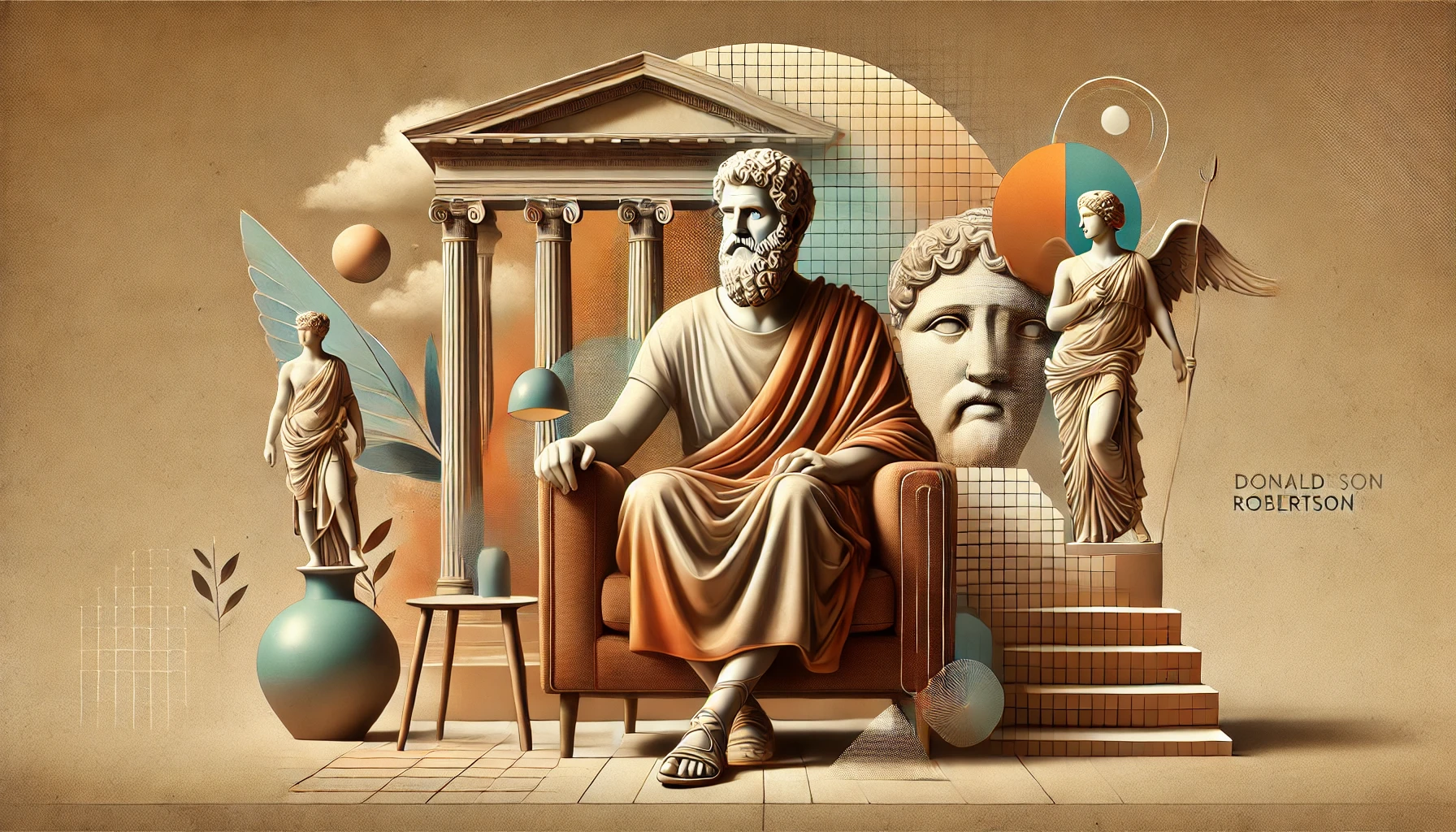Donald Robertson is a leading figure in the modern Stoic movement, known for his work in integrating Stoic philosophy with modern psychology. As a cognitive-behavioral psychotherapist and author, Robertson has made significant contributions to the revival of Stoicism as a practical philosophy for improving mental well-being. Through his books, workshops, and public speaking, he has helped thousands of people apply Stoic principles to navigate the challenges of contemporary life.
Who Is Donald Robertson?
Originally from Scotland, Donald Robertson has spent his career exploring the intersections of philosophy, psychology, and psychotherapy. With a background in cognitive-behavioral therapy (CBT), Robertson has a deep understanding of how thoughts and beliefs influence emotions and behavior. This understanding has shaped his approach to Stoicism, which he sees as a philosophical foundation for psychological resilience and well-being.
Robertson’s work is characterized by its practical focus, offering readers and clients actionable strategies for applying Stoic principles in their daily lives. He has become a key figure in the global Stoic community, contributing to the popularization of Stoicism through both traditional and digital media.
Key Contributions of Donald Robertson to Modern Stoicism
1. Integrating Stoicism with Cognitive-Behavioral Therapy (CBT)
One of Robertson’s most significant contributions to modern Stoicism is his integration of Stoic philosophy with cognitive-behavioral therapy (CBT). He argues that Stoicism, like CBT, focuses on the importance of managing thoughts and beliefs to maintain emotional balance and resilience.
“The Stoics believed that it’s not events that disturb us, but our opinions about them.” – Donald Robertson
Impact on Stoicism: By drawing parallels between Stoicism and CBT, Robertson has helped bridge the gap between ancient philosophy and modern psychology, making Stoicism more accessible to those interested in mental health and well-being.
2. Authoring Influential Books on Stoicism
Donald Robertson has written several influential books that explore the practical applications of Stoic philosophy, particularly in the context of modern life and therapy.
- Stoicism and the Art of Happiness: In this book, Robertson provides a comprehensive guide to applying Stoic principles to achieve greater happiness and well-being. He offers practical exercises based on both Stoic teachings and CBT techniques.
Read Stoicism and the Art of Happiness on Goodreads
- How to Think Like a Roman Emperor: This book blends historical narrative with practical philosophy, exploring the life of Marcus Aurelius and how his Stoic beliefs can be applied today. Robertson provides insights into how Stoicism can help individuals lead with wisdom, courage, and resilience.
Read How to Think Like a Roman Emperor on Goodreads
3. Promoting Stoicism as a Practical Philosophy
Robertson emphasizes the practical aspects of Stoicism, advocating for its use as a daily practice rather than just a theoretical framework. He offers workshops, online courses, and public talks that teach people how to incorporate Stoic exercises into their everyday routines.
“Stoicism isn’t just a philosophy to be learned; it’s a way of life to be lived.” – Donald Robertson
Impact on Stoicism: Robertson’s work has helped reframe Stoicism as a practical, actionable philosophy that can be integrated into everyday life, making it accessible to a broader audience.
4. Contributing to the Global Stoic Community
Donald Robertson is an active participant in the global Stoic community. He co-founded Modern Stoicism, a non-profit organization dedicated to the study and practice of Stoicism. The organization hosts events like Stoicon and Stoic Week, which attract thousands of participants from around the world.
“Stoic Week is an opportunity for people to try out Stoicism and see if it resonates with them as a way of life.” – Donald Robertson
Impact on Stoicism: Through his involvement with Modern Stoicism and other initiatives, Robertson has played a pivotal role in creating a vibrant, global community of Stoic practitioners and enthusiasts.
5. Applying Stoicism to Mental Health
Robertson’s unique contribution lies in his ability to apply Stoic principles to the field of mental health. He argues that Stoicism can provide powerful tools for managing stress, anxiety, and depression, and has used his expertise in CBT to develop practical exercises that help individuals build emotional resilience.
“The Stoics teach us that by changing our thoughts, we can change our emotions.” – Donald Robertson
Impact on Stoicism: Robertson has shown that Stoicism is not just an ancient philosophy but a relevant and effective approach to mental health in the modern world.
Conclusion
Donald Robertson has made a profound impact on the modern Stoic movement by bridging the gap between philosophy and psychology. His work has helped countless individuals apply Stoic principles to improve their mental well-being and lead more resilient, fulfilling lives. Whether you’re interested in Stoicism for its philosophical insights or its practical applications, Robertson’s work offers valuable guidance on how to live a life of wisdom, courage, and inner peace.

